2013年普通高等学校招生全国统一考试英语试题(山东卷,无答案)
- 格式:doc
- 大小:137.00 KB
- 文档页数:10
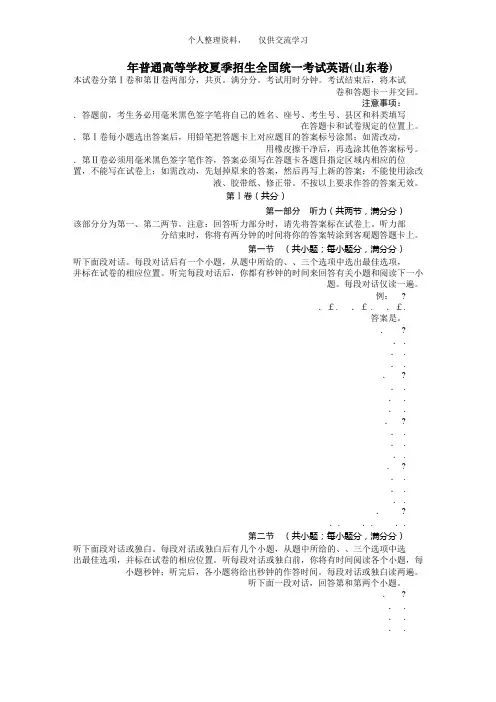
年普通高等学校夏季招生全国统一考试英语(山东卷)本试卷分第Ⅰ卷和第Ⅱ卷两部分,共页。
满分分。
考试用时分钟。
考试结束后,将本试卷和答题卡一并交回。
注意事项:.答题前,考生务必用毫米黑色签字笔将自己的姓名、座号、考生号、县区和科类填写在答题卡和试卷规定的位置上。
.第Ⅰ卷每小题选出答案后,用铅笔把答题卡上对应题目的答案标号涂黑;如需改动,用橡皮擦干净后,再选涂其他答案标号。
.第Ⅱ卷必须用毫米黑色签字笔作答,答案必须写在答题卡各题目指定区域内相应的位置,不能写在试卷上;如需改动,先划掉原来的答案,然后再写上新的答案;不能使用涂改液、胶带纸、修正带。
不按以上要求作答的答案无效。
第Ⅰ卷(共分)第一部分听力(共两节,满分分)该部分分为第一、第二两节。
注意:回答听力部分时,请先将答案标在试卷上。
听力部分结束时,你将有两分钟的时间将你的答案转涂到客观题答题卡上。
第一节(共小题;每小题分,满分分)听下面段对话。
每段对话后有一个小题,从题中所给的、、三个选项中选出最佳选项,并标在试卷的相应位置。
听完每段对话后,你都有秒钟的时间来回答有关小题和阅读下一小题。
每段对话仅读一遍。
例: ?.£. .£ . .£.答案是。
. ?. .. .. .. ?. .. .. .. ?. .. .. .. ?. .. .. .. ?......第二节(共小题;每小题分,满分分)听下面段对话或独白。
每段对话或独白后有几个小题,从题中所给的、、三个选项中选出最佳选项,并标在试卷的相应位置。
听每段对话或独白前,你将有时间阅读各个小题,每小题秒钟;听完后,各小题将给出秒钟的作答时间。
每段对话或独白读两遍。
听下面一段对话,回答第和第两个小题。
. ?. .. .. .. ' ?.. .. ..听下面一段对话,回答第和第两个小题。
. ?. .. .. .. ?. .. .. .听下面一段对话,回答第至第三个小题。
. ?. .. .. .. ?.. .. ... ?. . . . . .听下面一段对话,回答第至第四个小题。

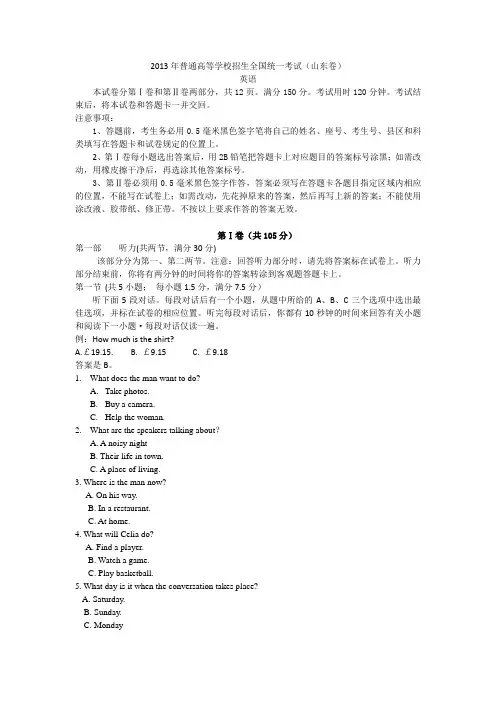
2013年普通高等学校招生全国统一考试(山东卷)英语本试卷分第Ⅰ卷和第Ⅱ卷两部分,共12页。
满分150分。
考试用时120分钟。
考试结束后,将本试卷和答题卡一并交回。
注意事项:1、答题前,考生务必用0.5毫米黑色签字笔将自己的姓名、座号、考生号、县区和科类填写在答题卡和试卷规定的位置上。
2、第Ⅰ卷每小题选出答案后,用2B铅笔把答题卡上对应题目的答案标号涂黑;如需改动,用橡皮擦干净后,再选涂其他答案标号。
3、第Ⅱ卷必须用0.5毫米黑色签字作答,答案必须写在答题卡各题目指定区域内相应的位置,不能写在试卷上;如需改动,先花掉原来的答案,然后再写上新的答案;不能使用涂改液、胶带纸、修正带。
不按以上要求作答的答案无效。
第Ⅰ卷(共105分)第一部听力(共两节,满分30分)该部分分为第一、第二两节。
注意:回答听力部分时,请先将答案标在试卷上。
听力部分结束前,你将有两分钟的时间将你的答案转涂到客观题答题卡上。
第一节(共5小题;每小题1.5分,满分7.5分)听下面5段对话。
每段对话后有一个小题,从题中所给的A、B、C三个选项中选出最佳选项,并标在试卷的相应位置。
听完每段对话后,你都有10秒钟的时间来回答有关小题和阅读下一小题·每段对话仅读一遍。
例:How much is the shirt?A.£19.15.B. £9.15C. £9.18答案是B。
1.What does the man want to do?A.Take photos.B.Buy a camera.C.Help the woman.2.What are the speakers talking about?A. A noisy nightB. Their life in town.C. A place of living.3. Where is the man now?A. On his way.B. In a restaurant.C. At home.4. What will Celia do?A. Find a player.B. Watch a game.C. Play basketball.5. What day is it when the conversation takes place?A. Saturday.B. Sunday.C. Monday第二节(共15小题; 每小题1.5分,满分22.5分)听下面5段对话。
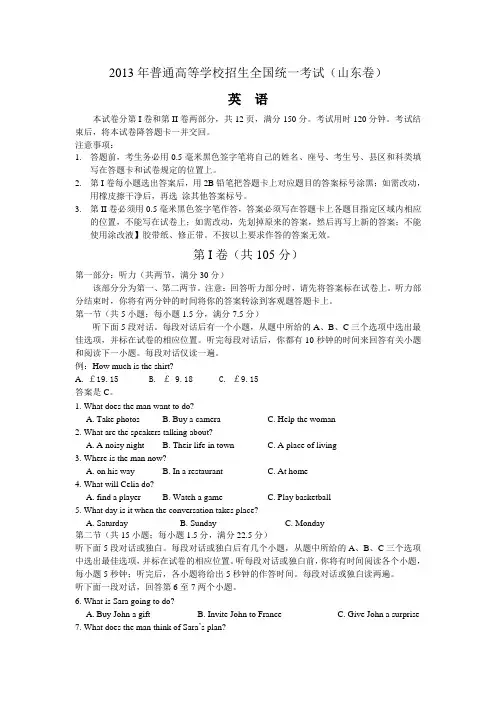
2013年普通高等学校招生全国统一考试(山东卷)英语本试卷分第I卷和第II卷两部分,共12页,满分150分。
考试用时120分钟。
考试结束后,将本试卷降答题卡一并交回。
注意事项:1.答题前,考生务必用0.5毫米黑色签字笔将自己的姓名、座号、考生号、县区和科类填写在答题卡和试卷规定的位置上。
2.第I卷每小题选出答案后,用2B铅笔把答题卡上对应题目的答案标号涂黑;如需改动,用橡皮擦干净后,再选涂其他答案标号。
3.第II卷必须用0.5毫米黑色签字笔作答,答案必须写在答题卡上各题目指定区域内相应的位置,不能写在试卷上;如需改动,先划掉原来的答案,然后再写上新的答案;不能使用涂改液】胶带纸、修正带。
不按以上要求作答的答案无效。
第I卷(共105分)第一部分:听力(共两节,满分30分)该部分分为第一、第二两节。
注意:回答听力部分时,请先将答案标在试卷上。
听力部分结束时,你将有两分钟的时间将你的答案转涂到客观题答题卡上。
第一节(共5小题;每小题1.5分,满分7.5分)听下面5段对话。
每段对话后有一个小题,从题中所给的A、B、C三个选项中选出最佳选项,并标在试卷的相应位置。
听完每段对话后,你都有10秒钟的时间来回答有关小题和阅读下一小题。
每段对话仅读一遍。
例:How much is the shirt?A.£19.15B. £ 9.18C. £9.15答案是C。
1. What does the man want to do?A. Take photosB. Buy a cameraC. Help the woman2. What are the speakers talking about?A. A noisy nightB. Their life in townC. A place of living3. Where is the man now?A. on his wayB. In a restaurantC. At home4. What will Celia do?A. find a playerB. Watch a gameC. Play basketball5. What day is it when the conversation takes place?A. SaturdayB. SundayC. Monday第二节(共15小题;每小题1.5分,满分22.5分)听下面5段对话或独白。
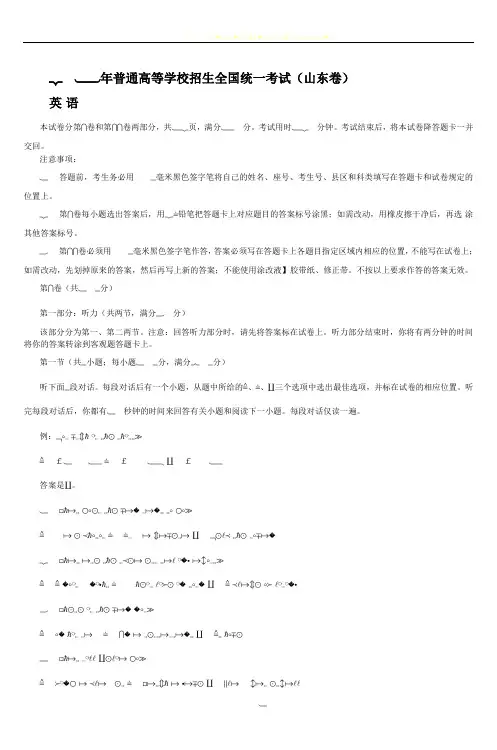
年普通高等学校招生全国统一考试(山东卷)英 语本试卷分第 卷和第 卷两部分,共 页,满分 分。
考试用时 分钟。
考试结束后,将本试卷降答题卡一并交回。
注意事项:答题前,考生务必用 毫米黑色签字笔将自己的姓名、座号、考生号、县区和科类填写在答题卡和试卷规定的位置上。
第 卷每小题选出答案后,用 铅笔把答题卡上对应题目的答案标号涂黑;如需改动,用橡皮擦干净后,再选 涂其他答案标号。
第 卷必须用 毫米黑色签字笔作答,答案必须写在答题卡上各题目指定区域内相应的位置,不能写在试卷上;如需改动,先划掉原来的答案,然后再写上新的答案;不能使用涂改液】胶带纸、修正带。
不按以上要求作答的答案无效。
第 卷(共 分)第一部分:听力(共两节,满分 分)该部分分为第一、第二两节。
注意:回答听力部分时,请先将答案标在试卷上。
听力部分结束时,你将有两分钟的时间将你的答案转涂到客观题答题卡上。
第一节(共 小题;每小题 分,满分 分)听下面 段对话。
每段对话后有一个小题,从题中所给的 、 、 三个选项中选出最佳选项,并标在试卷的相应位置。
听完每段对话后,你都有 秒钟的时间来回答有关小题和阅读下一小题。
每段对话仅读一遍。
例:£ £ £答案是 。
第二节(共 小题;每小题 分,满分 分)听下面 段对话或独白。
每段对话或独白后有几个小题,从题中所给的 、 、 三个选项中选出最佳选项,并标在试卷的相应位置。
听每段对话或独白前,你将有时间阅读各个小题,每小题 秒钟;听完后,各小题将给出 秒钟的作答时间。
每段对话或独白读两遍。
听下面一段对话,回答第 至 两个小题。
听下面一段圣诞,回答第 和第 两个小题听下面一段对话,回答第 至第 三个小题。
听下面一段对话,回答第 至 四个小题。
听下面一段独白,回答第 至 四个小题。
第二部分:英语知识运用(共两节 满分 分)第一节 单项填空(共 小题;每小题 分,满分 分)从 、 、 、 四个选项中,选出可以填入空白处的最佳选项,并在答题卡上将该项涂黑。
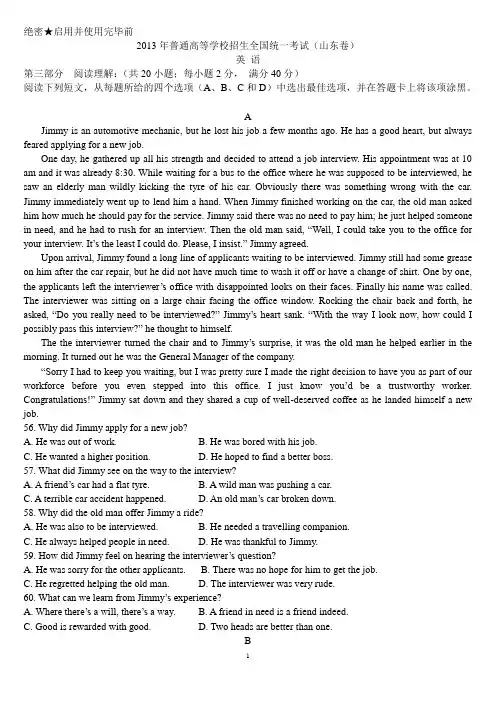
绝密★启用并使用完毕前2013年普通高等学校招生全国统一考试(山东卷)英语第三部分阅读理解:(共20小题;每小题2分,满分40分)阅读下列短文,从每题所给的四个选项(A、B、C和D)中选出最佳选项,并在答题卡上将该项涂黑。
AJimmy is an automotive mechanic, but he lost his job a few months ago. He has a good heart, but always feared applying for a new job.One day, he gathered up all his strength and decided to attend a job interview. His appointment was at 10 am and it was already 8:30. While waiting for a bus to the office where he was supposed to be interviewed, he saw an elderly man wildly kicking the tyre of his car. Obviously there was something wrong with the car. Jimmy immediately went up to lend him a hand. When Jimmy finished working on the car, the old man asked him how much he should pay for the service. Jimmy said there was no need to pay him; he just helped someone in need, and he had to rush for an interview. Then the old man said, “Well, I could take you to the office for your interview. It’s the least I could do. Please, I insist.” Jimmy agreed.Upon arrival, Jimmy found a long line of applicants waiting to be interviewed. Jimmy still had some grease on him after the car repair, but he did not have much time to wash it off or have a change of shirt. One by one, the applicants left the interviewer’s office with disappointed looks on their faces. Finally his name was called. The interviewer was sitting on a large chair facing the office window. Rocking the chair back and forth, he asked, “Do you really need to be interviewed?” Jimmy’s heart sank. “With the way I look now, how could I possibly pas s this interview?” he thought to himself.The the interviewer turned the chair and to Jimmy’s surprise, it was the old man he helped earlier in the morning. It turned out he was the General Manager of the company.“Sorry I had to keep you waiting, but I wa s pretty sure I made the right decision to have you as part of our workforce before you even stepped into this office. I just know you’d be a trustworthy worker. Congratulations!” Jimmy sat down and they shared a cup of well-deserved coffee as he landed himself a new job.56. Why did Jimmy apply for a new job?A. He was out of work.B. He was bored with his job.C. He wanted a higher position.D. He hoped to find a better boss.57. What did Jimmy see on the way to the interview?A. A friend’s car had a flat tyre.B. A wild man was pushing a car.C. A terrible car accident happened.D. An old man’s car broken down.58. Why did the old man offer Jimmy a ride?A. He was also to be interviewed.B. He needed a travelling companion.C. He always helped people in need.D. He was thankful to Jimmy.59. How did Jimmy feel on hearing the interviewer’s question?A. He was sorry for the other applicants.B. There was no hope for him to get the job.C. He regretted helping the old man.D. The interviewer was very rude.60. What can we learn from Jimmy’s experience?A. Where there’s a will, there’s a way.B. A friend in need is a friend indeed.C. Good is rewarded with good.D. Two heads are better than one.BGeorge Gershwin, born in 1898, was one of America’s greatest composers. He published his first song when he was eighteen years old. During the next twenty years he wrote more than five hundred songs.Many of Gershwin’s songs were first written for musical plays performed in theatr es in New York City. These plays were a popular form of entertainment in the 1920s and 1930s. Many of his songs have remained popular as ever. Over the years they have been sung and played in every possible way--- from jazz to country.In the 1920s there was a debate in the United States about jazz music. Could jazz, some people asked, be considered serious music? In 1924 jazz musician and orchestra leader Paul Whiteman decided to organize a special concert to show that jazz was serious music. Gershwin agreed to compose something for the concert before he realized he had just a few weeks to do it. And in that short time, he composed a piece for piano and orchestra which he called Phapsody in Blue. Gershwin himself played the piano at the concert. The audience were thrilled when they heard his music. It made him world-famous and showed that jazz music could be both serious and popular.In 1928, Gershwin went to Paris. He applied to study composition (作曲) with the well-known musician Nadia Boulanger, but she rejected him. She was afraid that classical study would ruin his jazz-influenced style. While there, Gershwin wrote An American in Paris. When it was first performed, critics (评论家) were divided over the music. Some called it happy and full of life, to others it was silly and boring. But it quickly became popular in Europe and the United States. It still remains one of his most famous works.George Gershwin died in 1937, just days after doctors learned he had brain cancer. He was only thirty-nine years old. Newspapers all over the world reported his death on their front pages. People mourned the loss of the man and all the music he might have still written.61. Many of Gershwin’s musical works were _____.A. written about New YorkersB. composed for Paul WhitemanC. played mainly in the countrysideD. performed in various ways62. What do we know about the concert organized by Whiteman?A. It attracted more people to theatres.B. It proved jazz could be serious music.C. It made Gershwin leader of the orchestra.D. It caused a debate among jazz musicians.63. What did Gershwin do during his stay in Paris?A. He created one of his best works.B. He studied with Nadia Boulanger.C. He argued with French critics.D. He changed his music style.64. What do we learn from the last paragraph?A. Many of Gershwin’s works were lost.B. The death of Gershwin was widely reported.C. A concert was held in memory of Gershwin.D. Brain cancer research started after Gershwin’s death.65. Which of the following best describes Gershwin?A. Talented and productive.B. Serious and boring.C. Popular and unhappy.D. Friendly and honest.CYou can’t always predict a heavy rain or remember your umbrella. But designer Mikhail Belyaev doesn’t think that forgetting to check the weather forecast before heading out should result in you getting wet. That’s why he created Lampbrella, a lamp post with it’s own rain-sensing umbrella.The designer says he came up with the idea after watching people get wet on streets in Russia. “Once, I was driving on a central Saint Petersburg street and saw the street lamps lighting up people trying to hide from the rain. I thought it would be appropriate to have a canopy (伞篷)built into a street lamp, ” he said.The Lampbrella is a standard-looking street lamp fitted with an umbrella canopy. It has a built-in electric motor which can open or close the umbrella on demand. Sensors (传感器) then ensure that the umbrella offerspedestrians shelter whenever it starts raining.In addition to the rain sensor, there’s also a 360° motion sensor on the fiberglass street lamp which detects whether anyone is using the Lampbrella. After three minutes of not being used the canopy is closed.According to the designer, the Lampbrella would move at a relatively low speed, so as not to cause harm to the pedestrians. Besides, it would be grounded to protect from possible lightning strike. Each Lampbrella would offer enough shelter for several people. Being installed (安装) at 2 metres off the ground, it would only be a danger for the tallest of pedestrians.While there are no plans to take the Lampbrella into production, Belyaev says he recently introduced his creation to one Moscow Department, and insists his creation could be installed on any street where a lot of people walk but there are no canopies to provide shelter.66. For what purpose did Belyaev create the Lampbrella?A. To predict a heavy rain.B. To check the weather forecast.C. To protect people from the rain.D. To remind people to take an umbrella.67. What do we know form Belyaev’s words in Paragraph 2?A. His creation was inspired by an experience.B. It rains a lot in the city of Saint Petersburg.C. Street lamps are protected by canopies.D. He enjoyed taking walks in the rains.68. Which of the following shows how the Lampbrella works?A.Motor→ canopy → sensorsB. Sensors → motor→ canopyC. Motor→ sensors → canopyD. Canopy→ motor→ sensors69. What does Paragraph 5 mainly tell us about the Lampbrella?A. Its moving speed.B. Its appearanceC. Its installation.D. Its safety.70. What can be inferred from the last paragraph?A. The designer will open a company to promote his product.B. The Lampbrella could be put into immediate production.C. The designer is confident that his creation is practical.D. The Lampbrella would be put on show in Moscow.DSparrow is a fast-food chain with 200 restaurants. Some years ago, the group to which Sparrow belonged was taken over by another company. Although Sparrow showed no sign of declining, the chain was generally in an unhealthy state. With more and more fast-food concepts reaching the market, the Sparrow menu had to struggle for attention. And to make matters worse, its new owner had no plans to give it the funds it required.Sparrow failed to grow for another two years, until a new CEO, Carl Pearson, decided to build up its market share. He did a survey, which showed that consumers who already used Sparrow restaurants were extremely positive about the chain, while customers of other fast-food chains were unwilling to turn away from them. Sparrow had to develop a new promotional campaign.Pearson faced a battle over the future of the Sparrow brand. The ch ain’s owner now favored rebranding Sparrow as Marcy’s restaurants. Pearson resisted, arguing for an advertising campaign designed to convince customers that visits to Sparrow restaurants were fun. Such an attempt to establish a positive relationship between a company and the general public was unusual for that time. Pearson strongly believed that numbers were the key to success, rather than customers’ spending power. Finally, the owner accepted his idea.The campaign itself changed the traditional advertising style of the fast-food industry. The TV ads of Sparrow focused on entertainment and featured original songs performed by a variety of stars. Instead of showing the superiority of a specific product, the intention was to put Sparrow in the hearts of potential customers.Pearson also made other decisions which he believed would contribute to the new Sparrow image. For example, he offered to lower the rent of any restaurants which achieved a certain increase in their turnover(营业额).These efforts paid off, and Sparrow soon became one of the most successful fast-food chains in the regions where it opened.71. Which was one of the problems Sparrow faced before Pearson became CEO?A. The number of its customers was declining.B. Its customers found the food unhealthy.C. It was in need of financial support.D. Most of its restaurants were closed.72. What does the underlined word “them” in Paragraph 2 refer to?A. Customers of Sparrow restaurants.B. Sparrow restaurants.C. Customers of other fast-food chains.D. Other fast-food chains.73. For what purpose did Pearson start the advertising campaign?A. To build a good relationship with the public.B. To stress the unusual tradition of Sparrow.C. To le arn about customers’ spending power.D. To meet the challenge from Marcy’s restaurants.74. The TV ads of Sparrow_______.A.changed people’s views on pop starsB. amused the public with original songs.C. focused on the superiority of its productsD. influenced the eating habits of the audience75. What was Pearson’s achievement as a CEO?A. He managed to pay off Sparrow’s debts.B. He made Sparrow much more competitive.C. He helped Sparrow take over a company.D. He improved the welfare of Sparrow employees.。
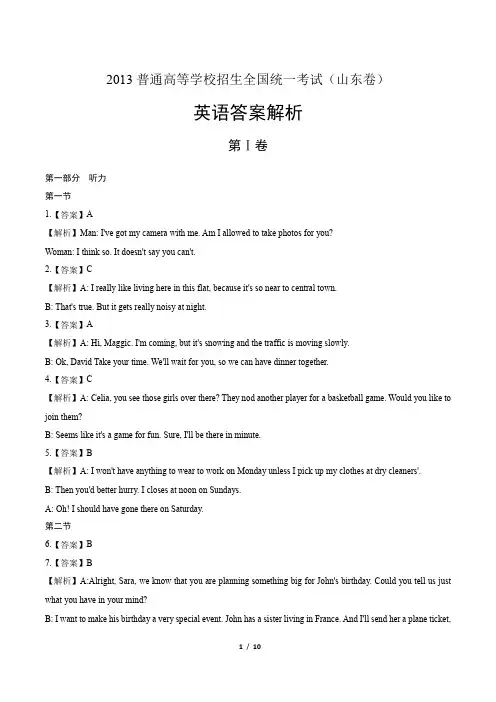
2013普通高等学校招生全国统一考试(山东卷)英语答案解析第Ⅰ卷第一部分听力第一节1.【答案】A【解析】Man: I've got my camera with me. Am I allowed to take photos for you?Woman: I think so. It doesn't say you can't.2.【答案】C【解析】A: I really like living here in this flat, because it's so near to central town.B: That's true. But it gets really noisy at night.3.【答案】A【解析】A: Hi, Maggic. I'm coming, but it's snowing and the traffic is moving slowly.B: Ok, David Take your time. We'll wait for you, so we can have dinner together.4.【答案】C【解析】A: Celia, you see those girls over there? They nod another player for a basketball game. Would you like to join them?B: Seems like it's a game for fun. Sure, I'll be there in minute.5.【答案】B【解析】A: I won't have anything to wear to work on Monday unless I pick up my clothes at dry cleaners'.B: Then you'd better hurry. I closes at noon on Sundays.A: Oh! I should have gone there on Saturday.第二节6.【答案】B7.【答案】B【解析】A:Alright, Sara, we know that you are planning something big for John's birthday. Could you tell us just what you have in your mind?B: I want to make his birthday a very special event. John has a sister living in France. And I'll send her a planeticket, so that she can be here for his birthday.A: Boy! What an excellent plan! That's something special. I can't guess some secret plans and we are waiting for the right time to tell him.B: Well, I didn't w ant to say anything until I was sure she could come.8.【答案】A9.【答案】B【解析】A: Hey, Peter, I'm sorry!B: Hi, Diana, What's wrong?A: We were going to Hong Kong this weekend, but I'm afraid I can't go.B: How come?A: I have a really big geography test and I have to study for it.B: We can go next week instead.A: No, I don't want to ruin you weekend. You go ahead and please take the book I bought to my friend Sally. Tell her I have to study all weekend, because I can't afford to fail the test.B: Ok, then I'll go with them. But it's a pity you can't come.10.【答案】A11.【答案】B12.【答案】A【解析】A: Hello, this is Andrea.B: Hello, Andrea, this is Alex. I have some very big news for you Miranda was very satisfied with you and said she was very much looking forward to working with you. Isn't that wonderful? Congratulations dear! How does it feel to be Miranda's new assistant? How I imagine that you'll just be delighted with this news. So let's see, you can start on Monday, right?A: Umm, well, I don't think I can start on Monday. I am visiting my father in Baltimore. And because I don't live in New York, I'll need a couple of days to find a flat and buy some furniture and move my things from Avon.B: Oh, well then, in that case I suppose Wednesday will be good. Ok see you then!13.【答案】C14.【答案】A15.【答案】A16.【答案】B【解析】Woman: Hello, Mr. Jan Erick Freedman. You're a frequent traveler. And we also know that you eat outtwice a day. How can you get so far and eating out.Man: When I my first job back in 1982 and started travelling. I had no other choice but eat out I found that I felt different due to what I was eating, so I tried to find places that served food that made me feel good. The secret was the quality of the food and how well the food was prepared.I made an effort to find out good restaurants as well as nice dishes.Woman: How did you manage to make a list of 218 favorite restaurants?Man: I've lived in cities and when I moved back to Sweden from the United States, people asked me where to go and eat and went to the cities I know. I got a lot of ideas. Then I wrote about restaurants for a Swedish club magazine and some suggested I gather information about restaurants together since I had all the facts about the restaurants I've been to. I started to do that.Woman: How do you find restaurants?Man: The best way is to ask the people there. I may talk to the people at the street market or take a walk and look for place for myself. I never asked hotel clerks or taxi drivers. I don't go either restaurants or places with menus too difficult to understand.17.【答案】C18.【答案】B19.【答案】C20.【答案】C【解析】Man: At the beginning of the tour, we all started the most important place at my town which is the Plaza Leon. The Plaza Leon is more than 100 years old. It's a gathering place for young people on Friday and Saturday nights, and for parents and children on Sunday afternoon. Four streets lead to the Plaza which have white sidewalks and tree lined. Hemandes Street which was named after writers born in the city contains all of the food stalls fish markets and vegetable stands. Femando Street which was named after a famous educator is where all of the government offices,Shops and houses. Via del Mar Street which is the only street which has old stone surfaces. Finally we came to the Hewish's Street on which there are two universities, one of which is the most famous university in my country. That's why it's my favorite street of all.第二部分英语知识运用第一节单项填空21.【答案】A【解析】any,each,another都用于三者或以上,只有either是用于两者之间。
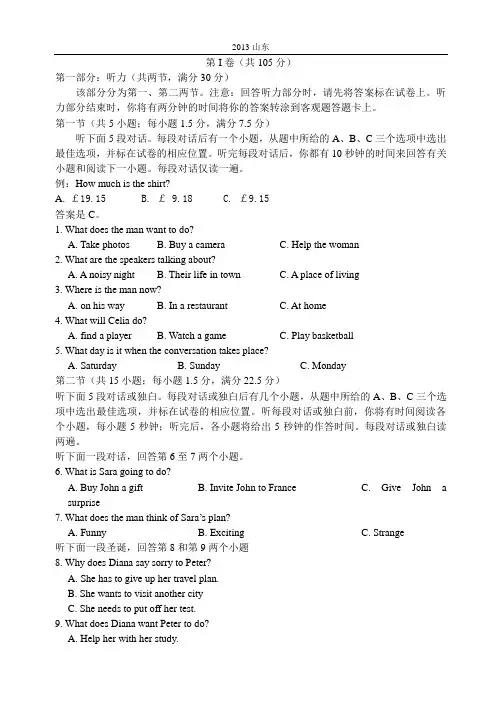
第I卷(共105分)第一部分:听力(共两节,满分30分)该部分分为第一、第二两节。
注意:回答听力部分时,请先将答案标在试卷上。
听力部分结束时,你将有两分钟的时间将你的答案转涂到客观题答题卡上。
第一节(共5小题;每小题1.5分,满分7.5分)听下面5段对话。
每段对话后有一个小题,从题中所给的A、B、C三个选项中选出最佳选项,并标在试卷的相应位置。
听完每段对话后,你都有10秒钟的时间来回答有关小题和阅读下一小题。
每段对话仅读一遍。
例:How much is the shirt?A.£19.15B. £ 9.18C. £9.15答案是C。
1. What does the man want to do?A. Take photosB. Buy a cameraC. Help the woman2. What are the speakers talking about?A. A noisy nightB. Their life in townC. A place of living3. Where is the man now?A. on his wayB. In a restaurantC. At home4. What will Celia do?A. find a playerB. Watch a gameC. Play basketball5. What day is it when the conversation takes place?A. SaturdayB. SundayC. Monday第二节(共15小题;每小题1.5分,满分22.5分)听下面5段对话或独白。
每段对话或独白后有几个小题,从题中所给的A、B、C三个选项中选出最佳选项,并标在试卷的相应位置。
听每段对话或独白前,你将有时间阅读各个小题,每小题5秒钟;听完后,各小题将给出5秒钟的作答时间。
每段对话或独白读两遍。
听下面一段对话,回答第6至7两个小题。
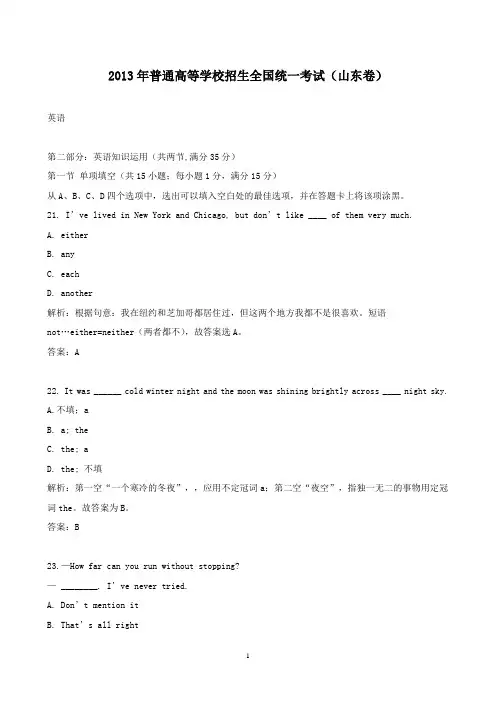
2013年普通高等学校招生全国统一考试(山东卷)英语第二部分:英语知识运用(共两节,满分35分)第一节单项填空(共15小题;每小题1分,满分15分)从A、B、C、D四个选项中,选出可以填入空白处的最佳选项,并在答题卡上将该项涂黑。
21. I’ve lived in New York and Chicago, but don’t like ____ of them very much.A. eitherB. anyC. eachD. another解析:根据句意:我在纽约和芝加哥都居住过,但这两个地方我都不是很喜欢。
短语not…either=neither(两者都不),故答案选A。
答案:A22. It was ______ cold winter night and the moon was shining brightly across ____ night sky.A.不填;aB. a; theC. the; aD. the; 不填解析:第一空“一个寒冷的冬夜”,,应用不定冠词a;第二空“夜空”,指独一无二的事物用定冠词the。
故答案为B。
答案:B23.—How far can you run without stopping?—________. I’ve never tried.A. Don’t mention itB. That’s all rightC. I have no ideaD. Go ahead解析:根据后句“我从未尝试过”,,可知“我不知道”。
故答案选C。
答案:C24. I didn’t think I’d like the movie, but actually it _____ pretty good.A. has beenB. wasC. had beenD. would be解析:根据题干部分didn’t可知基础时态为一般过去时态;,再根据句意:我认为我不会喜欢这部电影,而实际上这是部相当好的电影。
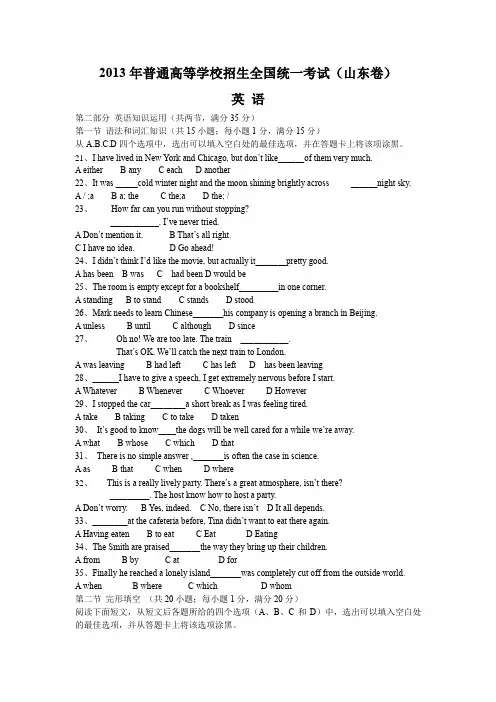
2013年普通高等学校招生全国统一考试(山东卷)英语第二部分英语知识运用(共两节,满分35分)第一节语法和词汇知识(共15小题;每小题1分,满分15分)从A.B.C.D四个选项中,选出可以填入空白处的最佳选项,并在答题卡上将该项涂黑。
21、I have lived in New York and Chicago, but don’t like______of them very much.A eitherB anyC eachD another22、It was _____cold winter night and the moon shining brightly across ______night sky.A / ;aB a; theC the;aD the; /23、-----How far can you run without stopping?-- --___________. I’ve never tried.A Don’t mention it.B That’s all right.C I have no idea.D Go ahead!24、I didn’t think I’d like the movie, but actually it_______pretty good.A has beenB wasC had beenD would be25、The room is empty except for a bookshelf_________in one corner.A standingB to standC standsD stood26、Mark needs to learn Chinese_______his company is opening a branch in Beijing.A unlessB untilC althoughD since27、------ Oh no! We are too late. The train ___________.------ That’s OK. We’ll catch the next train to London.A was leavingB had leftC has leftD has been leaving28、______I have to give a speech, I get extremely nervous before I start.A WhateverB WheneverC WhoeverD However29、I stopped the car________a short break as I was feeling tired.A takeB takingC to takeD taken30、It’s good to know____the dogs will be well cared for a while we’re away.A whatB whoseC whichD that31、There is no simple answer ,_______is often the case in science.A asB thatC whenD where32、-----This is a really lively party. There’s a great atmosphere, isn’t there?------_________. The host know how to host a party.A Don’t worry.B Yes, indeed.C No, there isn’tD It all depends.33、________at the cafeteria before, Tina didn’t want to eat there again.A Having eatenB to eatC EatD Eating34、The Smith are praised_______the way they bring up their children.A fromB byC atD for35、Finally he reached a lonely island_______was completely cut off from the outside world.A whenB whereC whichD whom第二节完形填空(共20小题;每小题1分,满分20分)阅读下面短文,从短文后各题所给的四个选项(A、B、C和D)中,选出可以填入空白处的最佳选项,并从答题卡上将该选项涂黑。
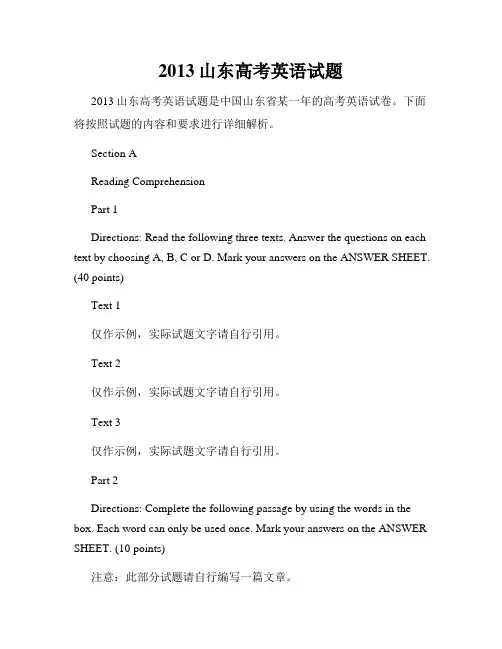
2013山东高考英语试题2013山东高考英语试题是中国山东省某一年的高考英语试卷。
下面将按照试题的内容和要求进行详细解析。
Section AReading ComprehensionPart 1Directions: Read the following three texts. Answer the questions on each text by choosing A, B, C or D. Mark your answers on the ANSWER SHEET.(40 points)Text 1仅作示例,实际试题文字请自行引用。
Text 2仅作示例,实际试题文字请自行引用。
Text 3仅作示例,实际试题文字请自行引用。
Part 2Directions: Complete the following passage by using the words in the box. Each word can only be used once. Mark your answers on the ANSWER SHEET. (10 points)注意:此部分试题请自行编写一篇文章。
Section BClozeDirections: Read the following passage. Choose the best word for each blank. Fill in each blank with a proper word chosen from the given options (A, B, C and D). Mark your answers on the ANSWER SHEET. (10 points)注意:此部分试题请自行编写一篇文章。
Section CTranslationDirections: Translate the following sentences into English. Write your translations on the ANSWER SHEET. (15 points)注意:此部分试题请自行编写一篇文章。
2013年普通高等学校招生全国统一考试(山东卷)英语本试卷分第I卷和第II卷两部分,共12页,满分150分。
考试用时120分钟。
考试结束后,将本试卷降答题卡一并交回。
注意事项:1.答题前,考生务必用0.5毫米黑色签字笔将自己的姓名、座号、考生号、县区和科类填写在答题卡和试卷规定的位置上。
2.第I卷每小题选出答案后,用2B铅笔把答题卡上对应题目的答案标号涂黑;如需改动,用橡皮擦干净后,再选涂其他答案标号。
3.第II卷必须用0.5毫米黑色签字笔作答,答案必须写在答题卡上各题目指定区域内相应的位置,不能写在试卷上;如需改动,先划掉原来的答案,然后再写上新的答案;不能使用涂改液】胶带纸、修正带。
不按以上要求作答的答案无效。
第I卷(共105分)第一部分:听力(共两节,满分30分)该部分分为第一、第二两节。
注意:回答听力部分时,请先将答案标在试卷上。
听力部分结束时,你将有两分钟的时间将你的答案转涂到客观题答题卡上。
第一节(共5小题;每小题1.5分,满分7.5分)听下面5段对话。
每段对话后有一个小题,从题中所给的A、B、C三个选项中选出最佳选项,并标在试卷的相应位置。
听完每段对话后,你都有10秒钟的时间来回答有关小题和阅读下一小题。
每段对话仅读一遍。
例:How much is the shirt?A.£19.15B. £ 9.18C. £9.15答案是C。
1. What does the man want to do?A. Take photosB. Buy a cameraC. Help the woman2. What are the speakers talking about?A. A noisy nightB. Their life in townC. A place of living3. Where is the man now?A. on his wayB. In a restaurantC. At home4. What will Celia do?A. find a playerB. Watch a gameC. Play basketball5. What day is it when the conversation takes place?A. SaturdayB. SundayC. Monday第二节(共15小题;每小题1.5分,满分22.5分)听下面5段对话或独白。
2013普通高等学校招生全国统一考试(山东卷)英语答案解析第Ⅰ卷第一部分听力第一节1.【答案】A【解析】Man: I've got my camera with me. Am I allowed to take photos for you?Woman: I think so. It doesn't say you can't.2.【答案】C【解析】A: I really like living here in this flat, because it's so near to central town.B: That's true. But it gets really noisy at night.3.【答案】A【解析】A: Hi, Maggic. I'm coming, but it's snowing and the traffic is moving slowly.B: Ok, David Take your time. We'll wait for you, so we can have dinner together.4.【答案】C【解析】A: Celia, you see those girls over there? They nod another player for a basketball game. Would you like to join them?B: Seems like it's a game for fun. Sure, I'll be there in minute.5.【答案】B【解析】A: I won't have anything to wear to work on Monday unless I pick up my clothes at dry cleaners'.B: Then you'd better hurry. I closes at noon on Sundays.A: Oh! I should have gone there on Saturday.第二节6.【答案】B7.【答案】B【解析】A:Alright, Sara, we know that you are planning something big for John's birthday. Could you tell us just what you have in your mind?B: I want to make his birthday a very special event. John has a sister living in France. And I'll send her a plane ticket,so that she can be here for his birthday.A: Boy! What an excellent plan! That's something special. I can't guess some secret plans and we are waiting for the right time to tell him.B: Well, I didn't w ant to say anything until I was sure she could come.8.【答案】A9.【答案】B【解析】A: Hey, Peter, I'm sorry!B: Hi, Diana, What's wrong?A: We were going to Hong Kong this weekend, but I'm afraid I can't go.B: How come?A: I have a really big geography test and I have to study for it.B: We can go next week instead.A: No, I don't want to ruin you weekend. You go ahead and please take the book I bought to my friend Sally. Tell her I have to study all weekend, because I can't afford to fail the test.B: Ok, then I'll go with them. But it's a pity you can't come.10.【答案】A11.【答案】B12.【答案】A【解析】A: Hello, this is Andrea.B: Hello, Andrea, this is Alex. I have some very big news for you Miranda was very satisfied with you and said she was very much looking forward to working with you. Isn't that wonderful? Congratulations dear! How does it feel to be Miranda's new assistant? How I imagine that you'll just be delighted with this news. So let's see, you can start on Monday, right?A: Umm, well, I don't think I can start on Monday. I am visiting my father in Baltimore. And because I don't live in New York, I'll need a couple of days to find a flat and buy some furniture and move my things from Avon.B: Oh, well then, in that case I suppose Wednesday will be good. Ok see you then!13.【答案】C14.【答案】A15.【答案】A16.【答案】B【解析】Woman: Hello, Mr. Jan Erick Freedman. You're a frequent traveler. And we also know that you eat out twicea day. How can you get so far and eating out.Man: When I my first job back in 1982 and started travelling. I had no other choice but eat out I found that I felt different due to what I was eating, so I tried to find places that served food that made me feel good. The secret was the quality of the food and how well the food was prepared.I made an effort to find out good restaurants as well as nice dishes.Woman: How did you manage to make a list of 218 favorite restaurants?Man: I've lived in cities and when I moved back to Sweden from the United States, people asked me where to go and eat and went to the cities I know. I got a lot of ideas. Then I wrote about restaurants for a Swedish club magazine and some suggested I gather information about restaurants together since I had all the facts about the restaurants I've been to. I started to do that.Woman: How do you find restaurants?Man: The best way is to ask the people there. I may talk to the people at the street market or take a walk and look for place for myself. I never asked hotel clerks or taxi drivers. I don't go either restaurants or places with menus too difficult to understand.17.【答案】C18.【答案】B19.【答案】C20.【答案】C【解析】Man: At the beginning of the tour, we all started the most important place at my town which is the Plaza Leon. The Plaza Leon is more than 100 years old. It's a gathering place for young people on Friday and Saturday nights, and for parents and children on Sunday afternoon. Four streets lead to the Plaza which have white sidewalks and tree lined. Hemandes Street which was named after writers born in the city contains all of the food stalls fish markets and vegetable stands. Femando Street which was named after a famous educator is where all of the government offices,Shops and houses. Via del Mar Street which is the only street which has old stone surfaces. Finally we came to the Hewish's Street on which there are two universities, one of which is the most famous university in my country. That's why it's my favorite street of all.第二部分英语知识运用第一节单项填空21.【答案】A【解析】any,each,another都用于三者或以上,只有either是用于两者之间。
2013年普通高等学校招生全国统一考试(山东卷)英语学校:___________姓名:___________班级:___________考号:___________I、单选题(本大题共15小题,共15.0分)1.I've lived in New York and Chicago,but don't like ______ of them very much.A.eitherB.anyC.eachD.another【答案】A【解析】考查不定代词。
句意:我曾经在纽约和芝加哥生活过一段时间,但是这两个城市我都不是很喜欢。
根据前面提到的这两个城市可知,此处表示两者,故排除any和another;either 表示“两者当中任何一个”,而each虽然可以表示两者中的每一个,但通常不与not连用,故只有A项正确。
2.It was ______ cold winter night and the moon was shining brightly across ______ night sky.A.不填;aB.a;theC.the;aD.the;不填【答案】B【解析】考查冠词。
句意:这是寒冷的冬日的一个夜晚,皎洁的月光照亮了夜空。
第一个空为泛指,故用不定冠词a;第二个空为特指,“这个夜晚的天空”,故用定冠词the。
3.—How far can you run without stopping?—______.I've never tried.A.Don't mention itB.That's all rightC.I have no ideaD.Go ahead【答案】C【解析】考查交际用语。
句意:——你不停地跑能跑多远?——我也不知道,我从来没试过。
Don't mention it.与That's all right.表示“不用谢,没关系”可以用于回答对方的感谢或是道歉;I have no idea.“不知道”;Go ahead.“干吧!说吧!用吧!继续”常用于祈使句中,根据句意可知,此处C项正确。
2013年普通高等学校招生全国统一考试英语试题(新课标I卷)预览说明:预览图片所展示的格式为文档的源格式展示,下载源文件没有水印,内容可编辑和复制2013年高考真题——英语(新课标I卷)解析版(1)第二部分英语知识运用(共两节,满分45分)第一节单项填空(共15小题;每小题1分,满分15分)21. — Why, this is nothing but common vegetable soup!— _______, madam. It's our soup of the day.A. Let me seeB. So it isC. Don't mention itD. Neither do I【答案】:A【解析】:本题考查交际用语。
句意:“哎呀,这只是普通的蔬菜汤!” “让我看看,女士。
这就是我们今天的汤。
”选项A适合用于此语境,可表示日常礼貌的交际表达;而选项B、C、D均不符合语境和句意要求。
22. They might just have a place _______ on the writing course — why don't you give it a try?A. leaveB. leftC. leavingD. to leave【答案】:B【解析】:本题考查非谓语动词。
句意:他们可能只保留了一个位置给写作课程——你为什么不试试看呢?leave作动词讲,可表示“使保留,留下备用”,leave和place 属于被动关系,故left作place的后置定语,表示“剩下的位置,保留的位置”。
23. Try not to cough more than you can _______ since it may cause problems to your lungs.A. checkB. allowC. stopD. help【答案】:D【解析】:本题考查固定用法。
2013年省高考英语试卷一、听力〔共10小题,总分值20分〕1.〔1分〕What does the man want to do?A.Take photos B.Buy a camera C.Help the woman.2.〔1分〕What are the speakers talking about?A.A noisy night B.Their life in town C.A place of living.3.〔1分〕Where is the man now?A.on his way B.In a restaurant C.At home.4.〔1分〕What will Celia do?A.find a player B.Watch a game C.Play basketball.5.〔1分〕What day is it when the conversation takes place?A.Saturday B.Sunday C.Monday.6.〔2分〕听下面一段对话,回答第6至7两个小题.6.What is Sara going to do?A.Buy John a gift B.Invite John to France C.Give John a surprise 7.What does the man think of Sara's plan?A.Funny B.Exciting C.Strange.8.〔2分〕听下面一段圣诞,回答第8和第9两个小题8.Why does Diana say sorry to Peter?A.She has to give up her travel plan.B.She wants to visit another cityC.She needs to put off her test.9.What does Diana want Peter to do?A.Help her with her study.B.Take a book to her friendC.Teach a geography lesson.10.〔3分〕听下面一段对话,回答第10至第12三个小题.10.Why does the man call the woman?A.To tell her about her new job.B.To ask about her job programC.To plan a meeting with her.11.Who needs a new flat?A.Alex B.Andrea C.Miranda 12.Where is the woman now?A.In Baltimore B.In New York C.In Avon.13.〔4分〕听下面一段对话,回答第13至16四个小题.13.What does Jan consider most important when he judges a restaurant?A.Where the restaurant isB.Whether the prices are lowC.How well the food is prepared14.When did Jan begin to write for a magazine?A.After he came back to SwedenB.Before he went to the United StatesC.As soon as he got his first job in 198215.What may Jan do to find a good restaurant?A.Talk to people in the streetB.Speak to taxi driversC.Ask hotel clerks16.What do we know about Jan?A.He cooks for a restaurantB.He travels a lot for his workC.He prefers American food.17.〔4分〕听下面一段独白,回答第17至20四个小题.17.What do we know about the Plaza Leon?A.It's a new building B.It's a small town C.It's a public place18.When do parents and children like going to the Plaza Leon?A.Saturday nights B.Sunday afternoonC.Fridays and Saturdays19.Which street is known for its food shops and markets?A.Via Del Mar Street B.Fernando Street C.Hernandes Street20.Why does the speaker like Horatio Street best?A.It has an old stone surface B.It is named after a writer C.It has afamous university.第二局部:英语知识运用〔共两节,总分值15分〕第一节单项填空〔共15小题;每题1分,总分值15分〕从A、B、C、D四个选项中,选出可以填入空白处的最正确选项21.〔1分〕I've lived in New York and Chicago,but don't like _______ of them very much.〔〕A.either B.any C.each D.another22.〔1分〕It was ______ cold winter night and the moon was shining brightly across_______ night sky.〔〕A.不填;a B.a; the C.the; a D.the;不填23.〔1分〕How far can you run without stopping?﹣________.I've never tried.〔〕A.Don't mention it B.That's all rightC.I have no idea D.Go ahead24.〔1分〕I didn't think I'd like the movie,but actually it _____ pretty good.〔〕A.has been B.was C.had been D.would be25.〔1分〕The room is empty except for a bookshelf _______ in one corner.〔〕A.standing B.to stand C.stands D.stood26.〔1分〕Mark needs to learn Chinese _______ his company is opening a branch in Beijing.〔〕A.unless B.until C.although D.since27.〔1分〕﹣Oh no!We're too late.The train _______.﹣That's Ok.We'll catch the next train to London.〔〕A.was leaving B.had leftC.has left D.has been leaving28.〔1分〕_________I have to give a speech,I get extremely nervous before I start.〔〕A.Whatever B.Whenever C.Whoever D.However29.〔1分〕I stopped the car _______ a short break as I was feeling tired.〔〕A.take B.taking C.to take D.taken30.〔1分〕It's good to know _____ the dogs will be well cared for while we're away.〔〕A.what B.whose C.which D.that31.〔1分〕There is no simple answer,_______ is often the case in science.〔〕A.as B.that C.when D.where32.〔1分〕﹣This is a really lively party.There's a great atmosphere,isn't there?﹣________ The hosts know how to host a party.〔〕A.Don't worry B.Yes,indeedC.No,there's isn't D.It all depends33.〔1分〕________ at the cafeteria before,Tina didn't want to eat there again.〔〕A.Having eaten B.To eat C.Eat D.Eating34.〔1分〕The Smiths are praised _______ the way they bring up their children.〔〕A.from B.by C.at D.for35.〔1分〕Finally he reached a lonely island _________ was completely cut off from the outside world.〔〕A.when B.where C.which D.whom第二节:完形填空〔共1小题;每题20分,总分值20分〕36.〔20分〕阅读下面短文,从短文后所给各题的四个选项〔A、B、C和D〕中,选出可以填入空白处的最正确选项,并在答题卡将该项涂黑.I used to be a very self﹣centered person,but in the past two years I have really changed.I have started to think about other people 〔36〕 I think about myself.I am happy that I am becoming a 〔37〕 person.I think my 〔38〕 started when I was at Palomar College.At first,I just wanted to get my〔39〕 and be left alone.I thought I was smarter than everyone else,so I hardly ever 〔40〕 to anyone in my classes.By the end of my first semester,I was really〔41〕.It seemed as if everyone but me had made friends and was having fun.So tried a〔n〕〔42〕 I started asking people around me how they were doing,and if they were having trouble I〔43〕 to help.That was really a big〔44〕 for me.By the end of the year,I had several new friends,and two of 〔45〕 are still my best friends today.A bigger cause of my new 〔46〕,however,came when I took a part﹣time job at a Vista Nursing Home.One old lady there who had Alzheimer's disease became my〔47〕.Every time I came into her room,she was so 〔48〕 because she thought I was her daughter.Her real daughter never〔49〕 her,so I took her place.She let me 〔50〕.that makingothers feel good make me feel good,too,when she died,I was 〔51〕,but I was very grateful to her.I think I am a much〔52〕 person today than I used to be,and I hope I will not 〔53〕 these experiences.They have 〔54〕 me to care about other people more than about myself.I〔55〕 who I am today,and I could not say that a few years ago.36.A.since B.before C.or D.unless 37.A.famous B.simple C.different D.skilled 38.A.education B.career C.tour D.change 39.A.balance C.homework C.degree D.interest 40.A.talked B.wrote C.lied D.reported41.A.careful B.lonely C.curious D.guilty 42.A.argument B.game C.experiment D.defence 43.A.dared B.offered C.hesitated D.happened44.A.dream B.problem C.duty D.step 45.A.us B.which C.them D.whom 46.A.attitude B.hobby C.hope D.luck 47.A.friend B.partner C.guide D.guest 48.A.polite B.happy C.strange D.confident49.A.bothered B.answered C.visited D.trusted 50.A.explain B.guess C.declare D.see 51.A.homeless B.heartbroken C.bad﹣tempered D.hopeless52.A.quieter B.busier C.better D.richer 53.A.forget B.face C.improve D.analyze 54.A.forced B.preferred C.ordered D.taught 55.A.miss B.like C.wonder D.expect第三局部:阅读理解〔共4小题;每题10分,总分值40分〕阅读以下短文,从每题所给的四个选项〔A、B、C和D〕中,选出最正确选项,并在答题卡上将该项涂黑.56.〔10分〕Jimmy is an automotive mechanic,but he lost his job a few months ago.He has good heart,but always feared applying for a new job.One day,he gathered up all his strength and decided to attend a job interview.His appointment was at 10am and it was already 8:30.While waiting for a bus to the office where he was supposed to be interviewed,he saw an elderly man wildly kicking the tyre of his car.Obviously there was something wrong with the car.Jimmy immediately went up to lend him a hand.When Jimmy finished working on the car,the old man asked him how much he should pay for the service.Jimmy said there was no need to pay him; he just helped someone in need,and he had to rush for an interview.Then the old man said,"Well,I could take you to the office for your interview.It's the least I could do.Please.I insist."Jimmy agreed.Upon arrival,Jimmy found a long line of applications waiting to be interviewed.Jimmy still had some grease on him after the car repair,but he did not have much time to wash it off or have a change of shirt.One by one,the applicants left the interviewer's office with disappointed look on their faces.Finally his name was called.The interviewer was sitting on a large chair facing the office window.Rocking the chair back and forth,he asked,"Do you really need to be interviewed?"Jimmy's heart sank."With the way I look now,how could I possibly pass this interview?"he thought to himself.Then the interviewer turned the chair and to Jimmy's surprise,it was the old man he helped earlier in the morning.It turned out he was the General Manager of the company."Sorry I had to keep you waiting,but I was pretty sure I made the right decision to have you as part of our workforce before you even stepped into the office.I just know you'd be a trustworthy worker.Congratulations!"Jimmy sat down and they shared a cup of well﹣deserved coffee as he landed himself a new job.56.Why did Jimmy apply for a new job?A.He was out of work B.He was bored with his jobC.He wanted a higher positionD.He hoped to find a better boss57.What did Jimmy see on the way to the interview?A.A friend's car had a flat tyreB.a wild man was pushing a carC.a terrible accident happened D.an old man's car broke down58.Why did the old man offer Jimmy a ride?A.He was also to be interviewed B.He needed a traveling companionC.He always helped people in needD.He was thankful to Jimmy59.How did Jimmy feel on hearing the interviewer's question?A.He was sorry for the other applicantsB.There was no hope for him to get the job C.He regretted helping the old man D.The interviewer was very rude60.What can we learn from Jimmy's experience?A.Where there is a will,there's a wayB.A friend in need is a friend indeed C.Good is rewarded with good.D.Two heads are better than one.61.〔10分〕George Gershwin,born in 1998,was one of America's greatest composers.He published his first song when the was eighteen years old.During the next twenty years he wrote more than five hundred songs.Many of Gershwin's songs were first written for musical plays performed in theatres in New York City.These plays were a popular form of entertainment in the 1920s and 1930s.Many of his songs have remained popular as ever.Over the years they have been sung and played in every possible way﹣from jazz to country.In the 1920s there was a debate in the United States about jazz music.Could jazz,some people asked,be considered serious music?In 1924jazz musician and orchestra leader Paul Whiteman decided to organize a special concert to show that jazz was serious music.Gershwin agreed to compose something for the concert before he realized he had just a few weeks to do it.And in that short time,he composed a piece for piano and orchestra which he called Rhapsody in Blue.Gershwin himself played the piano at the concert.The audience were thrilled when they heard hismusic.It made him world﹣famous and showed that jazz music could be both serious and popular.In 1928,Gershwin went to Paris.He applied to study composition 〔作曲〕with the well﹣known musician Nadia Boulanger,but she rejected him.She was afraid that classical study would ruin his jazz﹣influenced style.While there,Gershwin wrote An American in Paris.When it was first performed,critics 〔评论家〕were divided over the music.Some called it happy and full of life,to others it was silly and boring.But it quickly became popular in Europe and the United States.It sill remains one of his most famous works.George Gershwin died in 1937,just days after doctors learned he had brain cancer.He was only thirty﹣nine years old.Newspapers all over the world reported his death on their front pages.People mourned the loss of the man and all the music he might have still written.61.Many of Gershwin's musical works were.A.written about New Yorkers B.Composed for Paul WhitemanC.played mainly in the countrysideD.performed in various ways62.What do we know about the concert organized by Whiteman?A.It attracted more people to theatresB.It proved jazz could be serious musicC.It made Gershwin leader of the orchestraD.It caused a debate among jazz musicians.63.What did Gershwin do during his stay in Paris?A.He created one of his best worksB.He studied with Nadia BoulangerC.He argued with French criticsD.He changed his music style64.What do we learn from the last paragraph?A.Many of Gershwin's works were lostB.The death of Gershwin was widely reportedC.A concert was held in memory of GershwinD.Brain cancer research started after Gershwin's death.65.Which of the following best describes Gershwin?A.Talented and productiveB.Serious and boringC.popular and unhappy D.Friendly and honest.66.〔10分〕You can't always predict a heavy rain or remember your umbrella.But designer Mikhail Belvacv doesn't think that forgetting to check the weather forecast before heading out should result in you getting wet.That's why he created lampbrella,a lamp post with its own rain sensing umbrella.The designer says he come up with the idea after watching people get wet on streets in Russia."once,I was driving on a central Saint Petersburg street ad saw the street lamps lighting up people trying to hide from the rain.I thought it would be appropriate to have a canopy〔伞蓬〕built into a street lamp."he said.The lampbrella is a standard﹣looking street lamp fitted with an umbrella canopy.It has a built﹣in electric motor which can open or close the umbrella on demand.Sensors〔传感器〕then ensure that the umbrella offers pedestrians shelter whenever it starts raining.In addition to the rain sensor,there's also a 360°motion sensor on the biberglass street lamp which detects whether anyone's using the lampbrella.After three minutes of not being used the canopy is closed.According to the designer,the lampbrella would move at a relatively low speed,so as not to cause harm to the pedestrians.Besides,it would be grounded to protect from possible lighting strike.Each lampbrella would offer enough shelter for several people.Being installed at 2meters off the ground,it would only be a danger for the tallest of pedestrians.While there are no plans to take lampbrella into production,Belyacv says he recently introduced his creation one Moscow Department,and insists this creation could be installed on my street where a lot of people walk but there are no canopies to provide shelter.66.For what purpose did Belyacv create the lampbrella?A.To predict a heavy rain B.To check the weather forecastC.To protect people from the rain D.To remind people to take an umbrella 67.What do we know from Belyacv's worlds in Paragraph2?A.His creation was inspired by an experienceB.it rains a lot in the city of Saint PetersburgC.Street lamps are protected by canopiesD.He enjoyed taking walks in the rain68.Which of the following show how the lampbrella works?A.motor→canopy→sensors B.Sensors→motor→canopyC.motor→sensors→canopyD.canopy→motor→sensors69.What does paragraph 5mainly tell us about the lampbrella?A.Its moving speed B.Its appearanceC.Its installation D.Its safety70.What can be inferred from the last paragraph?A.The designer will open a company to promote his productB.The lampbrella could be put into immediate productionC.The designer is confident that his creation is practicalD.The lampbrella would be put on show in Moscow.71.〔10分〕Sparrow is a fast﹣food chain with 200 restaurants.Some years ago,the group to which Sparrow belonged was taken over by another company.Although Sparrow showed no sign of declining,the chain was generally in an unhealthy state.With more and more fast﹣food concepts reaching the market,the Sparrow menu had to struggle for attention.And to make matters worse,its new owner had no plans to give it the funds it required.Sparrow failed to grow for another two years.Until a new CEO,Carl Pearson,decided to build up its market share.He did a survey,which showed that consumers who already used Sparrow restaurants were extremely positive about the chain,while customers of other fast﹣food chains were unwilling to turn away from them.Sparrow had to develop a new promotional campaign.Pearson faced a battle over the future of the Sparrow brand.The chain's owner now favored rebranding Sparrow as Marcy's restaurants.Pearson resisted,arguing for an advertising campaign designed to convince customers that visits to Sparrow restaurants were fun.Such an attempt to establish a positive relationship between a company and the general public was unusual for that time.Pearson strongly believed that numbers were the key to success,rather than customers'speeding power.Finally,the owner accepted his idea.The campaign itself changed the traditional advertising style of the fast﹣food industry.The TV ads of Sparrow focused on entertainment and featured original sons performed by a variety of stars.Instead of showing the superiority of a specific product,the intention was to put Sparrow in the hearts of potential customers.Pearson also made other decisions which he believed would contribute to the new Sparrow image.For example,he offered to lower the rent of any restaurants which achieved a certain increase in their turnover.〔营业额〕These efforts paid off,and Sparrow soon became one of the most successful fast ﹣food chains in the regions where it operated.71.Which was one of the problems Sparrow faced before Pearson became CEO?A.The number of its customers was decliningB.Its customers found the food unhealthyC.It was in need of financial supportD.Most of its restaurants were closed72.What does the underlined word"them"in Paragraph 2refer to?A.Customers of Sparrow restaurants B.Sparrow restaurantsC.Customers of other fast﹣food chainsD.other fast﹣food chains73.For what purpose did Pearson start the advertising campaign?A.To build a good relationship with the publicB.To stress the unusual tradition of SparrowC.To lean about customers; spending power.D.To meet the challenge from Marcy's restaurants.74.The TV ads of Sparrow.A.changed people's views on pop starsB.amused the public with original songsC.focused on the superiority of its productsD.influenced the eating habits of the audience75.What was Pearson's achievement as a CEO?A.He managed to pay off Sparrow's debts.B.He made Sparrow much more competitiveC.He helped Sparrow take over a companyD.He improved the welfare of Sparrow employees.四.第四局部:书面表达〔共两节,总分值15分〕第一节阅读表达〔第76、77、80题每题3分,第78题4分,79题2分,总分值15分〕阅读下面短文并用英语回答以下问题,交答案与在答题卡相应的位置上〔请注意76、77、79和80四个小题后面的词数要求〕.76.〔15分〕[1]Jean Paul Getty was born in 1892in Minneapolis,Minnesota.He became a millionaire when he was only 24.His father was wealthy,but he did not help his son.Getty made his millions alone.He made his money from oil.He owned Getty Oil and over 100other companies.The Fortune magazine once called Getty"the richest man in the world."[2]But money.He married five times and divorced five times.He had five children but spent little time with them.None of Getty's children had very happy lives.[3]Getty loved to make money and loved to save it. In spite of his great wealth,Getty was miser.Every evening,he wrote down every cent he spent that day.He even put pay telephone in the guest's bedrooms in his house so he could save money on phone bills.[4]In 1973,kidnappers took his 16﹣year﹣old grandson,and demanded a large amount of money for his safe return.Getty's son asked his father for money to save his child.But Getty refused.The kidnappers were merciless and Getty's son made repeated requests for help from his father.Finally,Getty agreed to lend the money,but at 4percent interest.[5]Getty started a museum at his home Malibu,California.He bought many important and beautiful pieces of art for the museum.When Getty died in 1976,the value of the collection in the museum was $1billion.He left all his money to the museum.After his death,the museum grew in size.Today it is one of the most important museums in the United States.Getty made a large fortune in his life,but he gave his money to the art world because he wanted people to learn about and love art.76.What is the main idea of Paragraph 1?〔no more than 8words〕77.Fill in the blank in Paragraph 2with proper words.〔no more than 7words〕78.Explain the underlined sentence in Paragraph3.79.What did the kidnappers do to Getty's family 〔no more than 10words〕80.What does the author want to tell us about Getty in the last paragraph?〔no more than 10words〕.第二节写作〔总分值30分〕81.〔30分〕假设你是新华中学的学生华,你的美国朋友Tom一周前给你发电子,询问你暑假里的打算,但你因准备期末考试未能与时回复.请根据双下要点给他回封:〔1〕未与时回信的原因;〔2〕你假期的打算〔如做兼职、旅行、做志愿者等〕注意:1.词数:120﹣150;2.可适当增加细节,以使行文连贯.2013年省高考英语试卷参考答案与试题解析一、听力〔共10小题,总分值20分〕略第二局部:英语知识运用〔共两节,总分值15分〕第一节单项填空〔共15小题;每题1分,总分值15分〕从A、B、C、D四个选项中,选出可以填入空白处的最正确选项21.〔1分〕【考点】不定代词.【分析】我在纽约和芝加哥生活过,但我对这两个城市都不怎么喜欢.【解答】答案:A 此题考查不定代词的否认.either两个中的任意一个;any不定数目的任意一个;each每个;another不定数目中的另一个.题干中but表示转折,说明说话者不喜欢这两个城市;each在否认句中表示局部否认;either在否认句中表示全部否认,相当于neither.应选A.【点评】不定代词的用法灵活,特别是相似的结构.如此题中的either,用在肯定句中,表示两个中的任意一个;用的否认句中那么表示两个都不.平时学习时要注意区分和掌握.22.〔1分〕【考点】不定冠词;定冠词.【分析】那是一个寒冷的冬天的夜晚,夜空中月亮格外明亮.【解答】答案:B 题干中night通常与介词at连用,不用冠词;句中night被形容词修饰,表示具体的某一个夜晚,要用不定冠词a来限定;the night sky夜空.应选B.【点评】冠词是一种虚词,本身不能独立使用,只能放在名词前帮助说明名词所指的人或事物,它是英语词性中最小的一类,只有三个,一种是不定冠词a,an;一种是定冠词the.此外也有些特定场合不用冠词,即通常所称的零冠词.不定冠词表示泛指,定冠词表示特指.23.〔1分〕【考点】语言交际.【分析】﹣﹣﹣你不停地跑能跑多远?﹣﹣﹣我不知道,我没有试过.【解答】答案C.A项"不用";B项"没关系";D项"请便";C项"我不知道";根据答句中"I've never tried"中可知,我没有试过,所以我不知道.应选C.【点评】此题考查情景交际.解答此类题目首先应该读懂句意,分析上下文语境和逻辑关系.其次对每个选项中的交际用语的适用情况要掌握,根据语境锁定正确答案.关键平时学习中要对交际用语多积累多总结反复记忆.24.〔1分〕【考点】并列句.【分析】我认为我不会喜欢这部电影,而实际上这是部相当好的电影.【解答】答案选B根据I didn't think…movie,〔我认为我不会喜欢这部电影〕用了didn't是一般过去时,转折连词but 引导的句子也要使用一般过去时来描述前句提到的电影.应选B.【点评】一般过去时表示过去某一时候或某一段时间所发生了的事情或存在的状态.一般句中有语境的提示或者有明显的过去式的时间,如yesterday,just now,a moment ago,lastnight/year/week,once upon a time,the other day,in the past以与when 引导的表示过去的时间状语从句等连用.25.〔1分〕【考点】现在分词.【分析】除了一个书橱在墙角外,房间里空空荡荡.【解答】答案A."except for"是介词短语,其后不能接句子,所以排除C、D两项.分析句子结构可知,此处应为非谓语,且"a bookshelf"与动词"stand"之间为逻辑上的主动关系,所以选A.【点评】此题考查非谓语动词用法.解答此类题目首先要读懂句意分析句子结构,判断分词在句中所作的成分,假设分词与所修饰的名词是主动关系那么用doing,被动关系用done,表将来用to do.26.〔1分〕【考点】从属连词.【分析】麦克需要学习汉语了,因为他的公司在开了分公司.【解答】答案:Dunless除非;until直到;although尽管;since因为.题干表示的是因果关系,应选D.【点评】从属连词连接状语从句,类型较多,用法灵活.学习时要注意区分和掌握.27.〔1分〕【考点】现在完成时.【分析】﹣﹣﹣额,我们太迟了.火车已开走了.﹣﹣﹣没关系,我们将赶下一趟火车去伦敦.【解答】答案C.根据句中语境"我们太晚了"与后句"没关系.我们可以赶下一趟火车去伦敦",可知,火车已经离开,对现在造成影响,〔这趟〕火车已驶离车站,根据现在完成时的概念:表示过去的动作对现在造成影响,因此用现在完成时态符合语境,应选C.【点评】此题考查时态辨析.解答此类题目首先要读懂句意,捕捉信息,理解情境,综合运用,灵活答题,结合具体的语境,选出正确的时态.在平时学习的过程中,对每一种时态的用法要掌握到位.28.〔1分〕【考点】从属连词.【分析】不管什么时候我必须做演讲,我都会在开始前感到十分紧.【解答】答案Bwhatever"任何事物,一切事物;无论怎样",引导名词性从句或让步状语从句;whenever"每当;无论什么时候",引导时间状语从句或让步状语从句;whoever"…的人;无论是谁,不管是谁"引导名词性从句或让步状语从句;however"不管怎样",引导让步状语从句.根据句意:不管什么时候我必须做演讲,我都会在开始前感到十分紧.可知只有whenever符合句意,应选B.【点评】此题考查引导让步状语从句的从属连词,做题时根据主从句的关系,选择最正确答案.29.〔1分〕【考点】不定式.【分析】因为我感到累了,所以停下车进展短暂的休息.【解答】答案:C.根据后面 as引导的原因状语从句可知,我累了想休息一下,take a short break进展短暂的休息.stop doing停止正在做的事情;stop to do停下来做另一事.应选C.【点评】理清句子之间的逻辑关系以与分析句子的成分是解决这类题的一个关键.尤其是对句意的准确理解和翻译也是很重要的.30.〔1分〕【考点】连接代词.【分析】我们很满意地知道在我们离开期间狗被照顾得很好.【解答】答案:D.此题考查了宾语从句.know为与物动词,且后面的从句中不缺成分只少连接词,因此that 在此引导宾语从句而不做成分,也可以省略.what做主语、宾语或表语;whose和which做定语.【点评】做此类题的关键在于正确地分析句子成分.31.〔1分〕【考点】非限制性定语从句.【分析】科学往往如此,它没有一个简单的答案.【解答】答案A.分析句子结构可知,逗号之前是主句,逗号之后是非限制性定语从句,从句中缺少主语,从而排除C、D项;"that"不能用于非限制性定语从句中,因此A项符合语境,"as 正如",应选A.【点评】此题考查非限制性定语从句.解答此类题目首先要分析句子结构,非限制性定语从句中逗号是一个明显的标志,然后分析非限制性定语从句中的成分,如果缺成分用关系代词,如果不缺成分用关系副词.32.〔1分〕【考点】语言交际.【分析】﹣﹣这真的是一次很热闹的派对.气氛很好,不是吗?﹣﹣是的,确实是.〔这家的〕主人们知道如何举办聚会.【解答】答案B.A项"不要担心";C项"不,没有";D项"视情况而定";B项"对,没错";根据答语第二句"The hosts know how to host a party"的意思可知,空格处应为对上文的肯定,应选B.【点评】此题考查情景交际.解答此类题目首先应该读懂句意,分析上下文语境和逻辑关系.其次对每个选项中的交际用语的适用情况要掌握,根据语境锁定正确答案.关键平时学习中要对交际用语多积累多总结反复记忆.33.〔1分〕【考点】现在分词.【分析】以前在那家自助餐吃过饭,蒂娜不想再去那里吃了.【解答】答案 A分析句子结构可知,此处是非谓语作状语.句子的主语Tina与eat构成主谓关系,需用doing;再根据句中的关键词before知"eat"这一动作发生在主句谓语动词"didn't want"之前,故用doing的完成形式having done,因此此题选having eaten.B项to eat表示目的;C项eat动词原形不能做非谓语;D项eating表示主动进展的动作,不符合句意.应选A.【点评】此题考查非谓语动词中现在分词的完成式作状语.解答这类题的关键是分析句子结构,弄清非谓语动词与句子主语的关系以与与句子谓语动作发生的先后.34.〔1分〕【考点】原因介词.【分析】史密斯夫妇因为养育孩子的方法而受到表扬.【解答】答案:D praise sb for sth因为某事而表扬某人;题干中they bring up their children是修饰way的定语从句,不影响前面的句子结构;句子用的是被动be praised for sth.应选D.【点评】介词搭配较多,用法灵活.学习时要注意积累,特别是搭配短语的结构和用法要注意区分和掌握.35.〔1分〕【考点】关系代词.【分析】最后,他到达了一个完全与外界隔绝的孤岛.【解答】答案:C.此题是一个限制性定语从句,考查关系代词的用法.先行词island指物,其后应用关系代词which或that代替先行词island在定语从句中做主语且不可省略.when和where是关系副词在从句中只能做状语,whom是关系代词在从句中只做宾语.【点评】解答此题时要正确地分析句子成分,正确掌握关系代词和关系副词在定语从句中所做的成分.第二节:完形填空〔共1小题;每题20分,总分值20分〕36.〔20分〕【考点】人生感悟类阅读.【分析】本文讲述了作者的个人经历﹣﹣从一个以自我为中心的人到主动和别人交朋友并且照顾他人的人.一开始作者是个非常以自我为中心的人,以至于作者到了一个新学校直到学期末都没有交到朋友,因而作者感觉很孤单.之后作者主动和他人交朋友.此外,作者在一个医护所兼职,她和一个患老年痴呆症的老人交朋友,照顾这个老人.作者觉得让他人感到舒适,自己也同样会感觉舒适,帮助他人既是帮助自己.【解答】36.B 原文开始写到作者是个很自我中心的人〔I used to be a very self﹣centered person〕,但后来几年自己有了转变,不再是这样的人,因此可以推测作者的行为是"在考虑自己之前考虑别人"〔I have started to think about other people 〔36〕B I think about myself〕,答案为before.37.C 通读全文,可以了解到,作者很高兴自己从一个自我为中心的人转变成一个懂得关心他人的人,因此答案为C.38.D 从文章的写作结构可以知道,作者最早的变化是从一个事情开始的﹣﹣在 Palomar 大学读书的时候.故答案为D.39.C 一开始作者只想拿到学位,并不懂得跟别人交朋友.因此答案为C.40.A I thought I was smarter than everyone else前文说到自己觉得比任何人都聪明.可以推测作者平时很少和被人"交谈",故答案为A.41.B 联系前文所写的行为以与空格后的句子It seemed as if everyone but me had made friends and was having fun.可以推测,跟其他人相比,我没有交到朋友,我感觉很孤单.故答案为B.42.C 此处考查动词短语 try an experiment,意为尝试.当作者觉察自己很孤单的时候,可以推测到他开始尝试向他们交流,因此答案为C.43.B 考查动词词义的辨析.此处说明作者在尝试改变,态度应该是积极主动的.A.dared 敢于…,B.offered 提供,C.hesitated 犹豫,D.happened 发生.可以推测是主动"提供帮助",答案为B.44.D 名词的词义辨析.通过理解各项词义,联系前面的语境,可知这对我来说是"很大的一步",应该是a big step,答案为D.45.C 前面提到到了学期末,我交了一些朋友several friends,后指他们中的两个朋友在今天还是我最好的朋友,故答案为人称代词them.46.A 考查名词的辨析.通过理解各项词义,联系前面的语境,可知是"我的态度"的更大的转变,而不是指B.兴趣,C.希望,D.运气.因此答案为A.47.A 通过理解后文,可知是作者和一个患老年痴呆症的人交了朋友,故答案为A.48.B 联系后文,she thought I was her daughter.Her real daughter never〔49〕C her,so I took her place.她女儿从来不看她,她把我当成她的女儿,可见这个老人很高兴,故答案为B.49.C 联系前后文,可知是她女儿从来不来看她,可用动词visit.答案为C.50.D 考查动词词义的辨析.A.explain,解释;B.guess,猜想;C.declare,宣布;D.see 明白,看到.空格后讲的是我明白的一个道理that making others feel good make me feel good,too,〔她高兴,我也高兴〕,可知答案为D.51.B 形容词词义辨析.A.homeless 无家可归的,B.heartbroken心碎的,C.bad﹣tempered 暴脾气的,D.hopeless无望的,通过语境可知,作者是伤心的,答案为B.52.C 考查形容词词义辨析.通过上下文语义,可知我认为我成了更好的人,故答案为better.53.A 根据上下文语义,可知是我不会忘记这次经历,故答案为A.54.D 根据上下文语义,我不会忘记这次经历,因为它们教会了我…,故答案为D.55.B 根据理解全文,可知作者的态度是喜欢现在的自己,因此动词为like.【点评】做题时需联系上下文,结合语法知识,结合语境,选出正确的词语.第三局部:阅读理解〔共4小题;每题10分,总分值40分〕阅读以下短文,从每题所给的四个选项〔A、B、C和D〕中,选出最正确选项,并在答题卡上将该项涂黑.56.〔10分〕【考点】人物故事类.【分析】本文是一篇记叙文.Jimmy在应聘途中无偿地帮助的老人,而最后面试时发现,那位受帮助的老人正是他所去的面试公司的总经理,而后他被提供了那份工作.此文也告诉我们善有善报的道理.【解答】56.A.细节理解题.根据文章首句"Jimmy is an automotive mechanic,but he lost his job a few months ago"可知.文中lost his job被同义置换为was out of work.应选A.57.D.细节理解题.根据第二段话"he saw an elderly man wildly kicking the tyre of his car.Obviously there was something wrong with the car"说明老人的车抛锚了,具体什么问题,文章未提到.应选D.58.D.细节理解题.前文说到在修完车后他回绝了老人修理费;再根据老人所说"It's the least I could do.Please,I insist",可知老人是因为感激而主动送他去面试场的.应选D.59.B.细节理解题.根据老人的问题"你确实需要面试吗?"与Jimmy的所想"With the way I look now,how could I possibly pass this interview"可知,以他当时的状态,他无法通过面试.应选B.。
2013年普通高等学校招生全国统一考试(山东卷)英语第Ⅰ卷(共105分)第一部分听力(共两节,满分30分)该部分分为第一、第二两节。
注意:回答听力部分时,请先将答案标在试卷上。
听力部分结束时,你将有两分钟的时间将你的答案转涂到客观题答题卡上。
第一节(共5小题;每小题1.5分,满分7.5分)听下面5段对话。
每段对话后有一个小题,从题中所给的A、B、C三个选项中选出最佳选项,并标在试卷的相应位置。
听完每段对话后,你都有10秒钟的时间来回答有关小题和阅读下一小题。
每段对话仅读一遍。
例:How much is the shirt?A.£19.15 B.£9.18 C.£9.15答案是C。
1.What does the man want to do?A.Take photos. B.Buy a camera. C.Help the woman.答案 A2.What are the speakers talking about?A.A noisy night.B.Their life in town.C.A place of living答案 C3.Where is the man now?A.On his way. B.In a restaurant. C.At home.答案 A4.What will Celia do?A.Find a player.B.Watch a game.C.Play basketball.答案 C5.What day is it when the conversation takes place?A.Saturday. B.Sunday. C.Monday.答案 B第二节(共15小题;每小题1.5分,满分22.5分)听下面5段对话或独白。
每段对话或独白后有几个小题,从题中所给的A、B、C三个选项中选出最佳选项,并标在试卷的相应位置。
听每段对话或独白前,你将有时间阅读各个小题,每小题5秒钟;听完后,各小题将给出5秒钟的作答时间。
2013年普通高等学校招生全国统一考试(山东卷)英语本试卷分第I卷和第II卷两部分,共12页,满分150分。
考试用时120分钟。
考试结束后,将本试卷降答题卡一并交回。
注意事项:1.答题前,考生务必用0.5毫米黑色签字笔将自己的姓名、座号、考生号、县区和科类填写在答题卡和试卷规定的位置上。
2.第I卷每小题选出答案后,用2B铅笔把答题卡上对应题目的答案标号涂黑;如需改动,用橡皮擦干净后,再选涂其他答案标号。
3.第II卷必须用0.5毫米黑色签字笔作答,答案必须写在答题卡上各题目指定区域内相应的位置,不能写在试卷上;如需改动,先划掉原来的答案,然后再写上新的答案;不能使用涂改液】胶带纸、修正带。
不按以上要求作答的答案无效。
第I卷(共105分)第一部分:听力(共两节,满分30分)该部分分为第一、第二两节。
注意:回答听力部分时,请先将答案标在试卷上。
听力部分结束时,你将有两分钟的时间将你的答案转涂到客观题答题卡上。
第一节(共5小题;每小题1.5分,满分7.5分)听下面5段对话。
每段对话后有一个小题,从题中所给的A、B、C三个选项中选出最佳选项,并标在试卷的相应位置。
听完每段对话后,你都有10秒钟的时间来回答有关小题和阅读下一小题。
每段对话仅读一遍。
例:How much is the shirt?A. £19.15B. £ 9.18C. £9.15答案是C。
1. What does the man want to do?A. Take photosB. Buy a cameraC. Help the woman2. What are the speakers talking about?A. A noisy nightB. Their life in townC. A place of living3. Where is the man now?A. on his wayB. In a restaurantC. At home4. What will Celia do?A. find a playerB. Watch a gameC. Play basketball5. What day is it when the conversation takes place?A. SaturdayB. SundayC. Monday第二节(共15小题;每小题1.5分,满分22.5分)听下面5段对话或独白。
每段对话或独白后有几个小题,从题中所给的A、B、C三个选项中选出最佳选项,并标在试卷的相应位置。
听每段对话或独白前,你将有时间阅读各个小题,每小题5秒钟;听完后,各小题将给出5秒钟的作答时间。
每段对话或独白读两遍。
听下面一段对话,回答第6至7两个小题。
6. What is Sara going to do?A. Buy John a giftB. Invite John to FranceC. Give John asurprise7. What does the man think of Sara’s plan?A. FunnyB. ExcitingC. Strange听下面一段圣诞,回答第8和第9两个小题8. Why does Diana say sorry to Peter?A. She has to give up her travel plan.B. She wants to visit another cityC. She needs to put off her test.9. What does Diana want Peter to do?A. Help her with her study.B. Take a book to her friendC. Teach a geography lesson.听下面一段对话,回答第10至第12三个小题。
10. Why does the man call the woman?A. To tell her about her new job.B. To ask about her job programC. To plan a meeting with her.11. Who needs a new flat?A. AlexB. AndreaC. Miranda12. Where is the woman now?A. In BaltimoreB. In New YorkC. In Avon听下面一段对话,回答第13至16四个小题。
13. What does Jan consider most important when he judges a restaurant?A. Where the restaurant isB. Whether the prices are lowC. How well the food is prepared14. When did Jan begin to write for a magazine?A. After he came back to SwedenB. Before he went to the United StatesC. As soon as he got his first job in 198215. What may Jan do to find a good restaurant?A. Talk to people in the streetB. Speak to taxi driversC. Ask hotel clerks16. What do we know about Jan?A. He cooks for a restaurantB. He travels a lot for his workC. He prefers American food.听下面一段独白,回答第17至20四个小题。
17. What do we know about the Plaza Leon?A. It’s a new buildingB. It’s a small townC. It’s a publicplace18. When do parents and children like going to the Plaza Leon?A. Saturday nightsB. Sunday afternoonC. Fridays and Saturdays19. Which street is known for its food shops and markets?A. Via Del Mar StreetB. Fernando StreetC. Hernandes Street20. Why does the speaker like Horatio Street best?A. It has an old stone surfaceB. It is named after a writerC. It has a famous university第二部分:英语知识运用(共两节,满分35分)第一节单项填空(共15小题;每小题1分,满分15分)从A、B、C、D四个选项中,选出可以填入空白处的最佳选项,并在答题卡上将该项涂黑。
21. I’ve lived in New York and Chicago, but don’t like ____ of them very much.A. eitherB. anyC. eachD. another22. It was ______ cold winter night and the moon was shining brightly across ____night sky.A. 不填;aB. a; theC. the; aD.the; 不填23. — How far can you run without stopping?— ________. I’ve never tried.A. Don’t mention itB. That’s all rightC. I have no ideaD. Go ahead24. I didn’t think I’d like the movie, but actually it _____ pretty good.A. has beenB. wasC. had beenD.would be25. The room is empty except for a bookshelf _____ in one corner.A. standingB. to standC. standsD.stood26. Mark needs to learn Chinese _______ his company is opening a branch in Beijing.A. unlessB. untilC. althoughD.since27. — Oh no! We’re too late. The train _______.— That’s Ok. We’ll catch the next train to London.A. was leavingB. had leftC. has leftD.has been leaving28. _________I have to give a speech, I get extremely nervous before I start.A. WhateverB. WheneverC. WhoeverD.However29. I stopped the car ____ a short break as I was feeling tired.A. takeB. takingC. to takeD. taken30. It’s good to know _____ the dogs will be well cared for while we’re away.A. whatB. whoseC. whichD.that31. There is no simple answer, _____ is often the case in science.A. asB. thatC. whenD. where32. — This is a really lively party. There’s a great atmosphere, isn’t there?— ________ The hosts know how to host a party.A. Don't worryB. Yes, indeedC. No, there’s isn’tD. It all depends33. ________ at the cafeteria before, Tina didn’t want to eat there again.A. Having eatenB. To eatC. EatD. Eating34. The Smiths are praised _______ the way they bring up their children.A. fromB. byC. atD. for35. Finally he reached a lonely island _________ was completely cut off from theoutside world.A. whenB. whereC. whichD.whom第二节:完形填空(共20小题;每小题1分,满分20分)阅读下面短文,从短文后所给各题的四个选项(A、B、C和D)中,选出可以填入空白处的最佳选项,并在答题卡将该项涂黑。